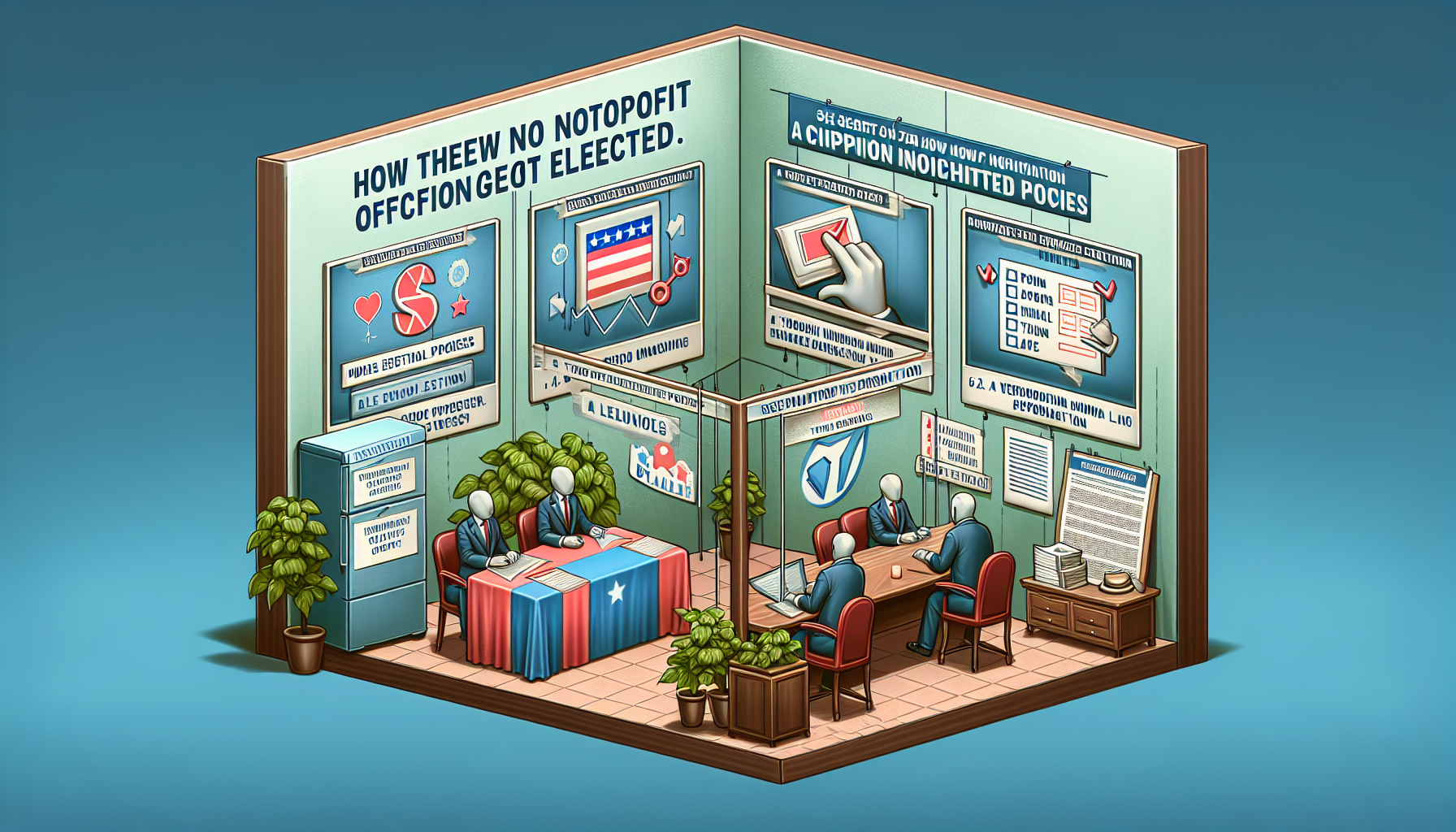Elections for nonprofit officers can feel overwhelming. Many nonprofits struggle with low participation and unclear processes. This can lead to unqualified individuals in leadership roles, ultimately affecting the mission and goals of the organization. However, understanding how to navigate this process can empower nonprofits to elect effective leaders who drive positive change.
Here’s what you’ll learn in this post:
- The critical functions of nonprofit officers and their impact on the organization.
- Why elections matter for nonprofits and how they strengthen community ties.
- Strategies for engaging supporters and creating a successful election campaign.
Understanding the Election Process for Nonprofit Officers
The election process for nonprofit officers is crucial for maintaining a strong leadership team. Typically, this process involves nominations, campaigning, and voting. Each step plays a vital role in ensuring that the right individuals are chosen to guide the organization. By understanding this process, nonprofits can foster transparency and encourage greater participation from their members.
When members know how the process works, they are more likely to engage and express their opinions. This not only builds trust but also strengthens the overall community around the nonprofit. A well-informed electorate can lead to better decision-making and stronger leadership.
What is the Role of Nonprofit Officers?
Nonprofit officers serve essential functions within an organization. They are responsible for guiding the mission, managing resources, and ensuring compliance with regulations. Common officer roles include the president, treasurer, and secretary. Each of these positions has unique responsibilities that contribute to the organization’s success.
For example, the president leads meetings and sets the strategic direction. The treasurer manages finances, while the secretary keeps records and handles communication. Together, these officers create a cohesive team that drives the organization forward. Their leadership is vital for attracting donors and volunteers, making it crucial to elect capable individuals.
Importance of Nonprofit Officer Elections
Elections for nonprofit officers hold significant importance for several reasons. First, they ensure that leadership reflects the values and needs of the community. When members participate in the election process, they feel a sense of ownership over the organization. This can lead to increased engagement and support.
Moreover, officer elections can enhance the credibility of the nonprofit. A transparent election process demonstrates accountability to stakeholders. It fosters trust among donors and volunteers, which is essential for long-term sustainability. By prioritizing these elections, nonprofits can build a stronger foundation for their mission and inspire greater community involvement.

Building Strong Community Relationships
Building strong community relationships is essential for the success of nonprofit officers. When leaders connect with their local community, they create a network of support that can help the organization thrive. This involves understanding the needs and interests of community members, which fosters trust and collaboration. A solid relationship with the community can lead to increased volunteer engagement, donor support, and overall visibility.
Moreover, strong ties within the community can help nonprofits identify potential leaders who are passionate about their mission. By engaging with local supporters, organizations can cultivate a sense of belonging and inspire individuals to take on leadership roles. Ultimately, these relationships are crucial for creating a sustainable and impactful nonprofit.
Engaging with Local Supporters
Engaging with local supporters is a vital strategy for nonprofits aiming to strengthen their election process. This can be achieved through various methods, such as hosting community events, workshops, or informational sessions. These activities allow nonprofits to showcase their work and gather feedback from supporters.
Additionally, nonprofits can utilize social media platforms to share updates and encourage conversations. By actively involving local supporters in discussions about the organization’s direction, nonprofits can foster a sense of ownership. When supporters feel valued, they are more likely to participate in elections and advocate for candidates who align with their vision.
Networking with Other Nonprofits
Networking with other nonprofits can significantly enhance the election process for nonprofit officers. Collaborating with similar organizations allows for the sharing of best practices and resources. By learning from each other’s experiences, nonprofits can improve their election strategies and increase voter turnout.
Joint events or campaigns can also help create a larger platform for raising awareness about officer elections. When multiple organizations come together, they can amplify their message and reach a wider audience. This collaborative approach not only strengthens individual nonprofits but also builds a more connected and supportive nonprofit community.
Demonstrating Leadership Skills
Demonstrating leadership skills is crucial for individuals seeking election as nonprofit officers. Effective leaders inspire and motivate others, fostering a culture of collaboration and innovation. To showcase these skills, potential candidates can participate in community initiatives or lead projects within the organization.
By taking charge of specific tasks, they can demonstrate their ability to manage teams and make informed decisions. Additionally, sharing success stories and lessons learned from previous experiences can help build credibility. When candidates exhibit strong leadership qualities, they become more appealing to voters, increasing their chances of being elected.
Showcasing Experience in Nonprofit Work
Showcasing experience in nonprofit work is vital for candidates aiming for officer positions. Voters want to see that candidates have a solid understanding of the organization’s mission and operations. This can be achieved by highlighting previous roles, such as volunteering, serving on committees, or leading projects.
Candidates should provide specific examples of their contributions and the impact they made. For instance, if someone organized a successful fundraising event, sharing the results can demonstrate their effectiveness. By clearly presenting their experience, candidates can instill confidence in voters, making them more likely to support their election.
Volunteering for Leadership Roles
Volunteering for leadership roles within the nonprofit sector is an excellent way to gain valuable experience and visibility. Individuals interested in becoming officers should actively seek opportunities to serve on boards or committees. This hands-on experience allows them to understand the inner workings of the organization and develop essential skills.

Moreover, volunteering helps build relationships with current officers and other members. These connections can lead to endorsements and greater support during elections. By showing commitment through volunteering, candidates can prove their dedication to the organization, making them more attractive choices for voters.
Effective Communication Strategies
Effective communication strategies are essential for nonprofit officers looking to engage their community and promote their election. Clear and transparent communication fosters trust and encourages participation from supporters. Officers should focus on delivering messages that resonate with their audience, emphasizing the organization’s mission and goals.
By using various communication channels, such as newsletters, meetings, and social media, they can reach a broader audience. It’s also important to listen actively to feedback and concerns from members. This two-way communication helps build stronger relationships and ensures that everyone feels valued and heard.
Crafting a Clear and Compelling Message
Crafting a clear and compelling message is key to attracting voter support during nonprofit officer elections. Candidates should focus on their vision for the organization and how they plan to achieve it. A strong message should highlight the candidate’s qualifications, experience, and commitment to the nonprofit’s mission.
Using simple language and relatable examples can make the message more engaging. For instance, sharing personal stories about why they are passionate about the cause can create an emotional connection with voters. Ultimately, a well-crafted message can significantly influence voter perceptions and increase the chances of election success.
Utilizing Social Media to Reach Voters
Utilizing social media to reach voters is a powerful strategy for nonprofit officers. Platforms like Facebook, Twitter, and Instagram allow candidates to share their message with a wider audience quickly. By creating engaging content—such as videos, infographics, or live Q&A sessions—candidates can capture the attention of potential voters.
Additionally, social media enables direct interaction with supporters. Candidates can respond to questions, share updates, and encourage discussions around the election. This level of engagement not only boosts visibility but also creates a sense of community among supporters, making them more likely to participate in the voting process.
Mobilizing Support from Current Members
Mobilizing support from current members is crucial for the success of nonprofit officer elections. Engaging existing supporters can create a strong foundation for a candidate’s campaign. To do this, candidates should communicate regularly with members, sharing updates about the election and encouraging them to get involved.
Personal outreach, such as phone calls or personalized emails, can make members feel valued and more willing to support the campaign. Additionally, highlighting the importance of their vote in shaping the future of the organization can motivate members to take action. When current members are mobilized, they can help spread the word and rally additional support for the candidate.
Encouraging Member Participation
Encouraging member participation is essential for ensuring a vibrant and engaged nonprofit community. Candidates should actively seek input from members regarding the election process and their expectations for leadership. This can be done through surveys, town hall meetings, or informal discussions.
Creating opportunities for members to voice their opinions fosters a sense of ownership in the organization. Additionally, candidates can offer incentives for participation, such as recognition or rewards for those who engage in the election process. By making participation appealing, candidates can boost voter turnout and strengthen the overall impact of the election.
Organizing Campaign Events
Organizing campaign events is an effective way to connect with voters and generate enthusiasm around the election. Candidates can host informal gatherings, such as meet-and-greets or open houses, where members can learn more about their vision and ask questions.

Additionally, candidates can collaborate with local businesses or community organizations to co-host events, expanding their reach. Fundraising events, workshops, or volunteer days can also serve as platforms to promote the candidate’s message while engaging supporters. These events not only build relationships but also create a sense of community that encourages members to participate in the election.
Understanding the Voting Process
Understanding the voting process is vital for ensuring a smooth election for nonprofit officers. Each organization has its own set of rules, typically outlined in their bylaws. These rules dictate how elections are conducted, including eligibility to vote, nomination procedures, and the voting method.
Candidates and members should familiarize themselves with these regulations to avoid confusion on election day. Clear communication about the voting process helps ensure that all members feel informed and empowered to participate. By understanding the voting process, nonprofits can enhance transparency and encourage higher turnout at elections.
What to Know About Nonprofit Bylaws
Nonprofit bylaws are essential documents that govern the organization’s operations, including the election process. They outline key details such as the number of officers, terms of service, and procedures for nominations and voting. Understanding these bylaws is crucial for both candidates and voters.
Candidates should review the bylaws to ensure they meet all eligibility requirements and adhere to the election guidelines. Voters must also be aware of these rules to understand their rights and responsibilities. By promoting awareness of the bylaws, nonprofits can foster a more informed electorate, leading to fair and effective elections.
Preparing for the Election Day
Preparing for election day is critical for ensuring a successful outcome in nonprofit officer elections. Candidates should create a detailed plan that includes logistics, communication strategies, and voter outreach. This may involve setting up polling locations, arranging for ballots, and training volunteers to assist on the day of the election.
Additionally, candidates should remind members of the election date and encourage them to participate. Providing clear instructions on how to vote, whether in-person or online, can help alleviate any confusion. By being well-prepared, nonprofits can create a positive voting experience that encourages member participation and strengthens community engagement.



